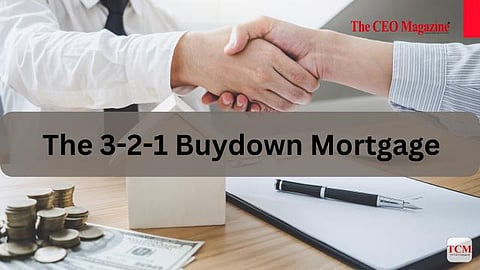
- News
- Women
- Magazine
- IndustryIndustry
- InsightsInsights
- Success Stories
- PublishPublish
- ContactContact
- Media KitMedia Kit

The 3-2-1 Buydown Mortgage
A Comprehensive Guide
In today's housing market, buying a home can seem tough, especially with high mortgage rates. But don't worry! There's a financial solution called a 3-2-1 buydown mortgage that might help you buy your dream home.
Let's discuss this mortgage in detail, along with its benefits and drawbacks.
A 3-2-1 buydown mortgage is a type of home loan designed to assist potential homebuyers in securing homeownership, especially when faced with high mortgage rates.
The distinguishing feature of this mortgage is the reduction of the interest rate for the first three years of the loan term. This reduction follows a pattern: 3% in the first year, 2% in the second year, and 1% in the third year. For instance, if you have a 5% mortgage, during the first year, you would only pay 2% interest.
The mechanics of a 3-2-1 buydown mortgage involve a temporary reduction in the interest rate, typically covered by the seller, homebuilder, or even the lender.
This reduction aims to make the initial years of homeownership more affordable for the buyer. After the buydown period ends, usually after three years, the original interest rate applies for the remainder of the mortgage term.
Enhanced Affordability: Offers lower initial interest rates, making homeownership more accessible.
Seller Advantage: Provides sellers with a tool to attract buyers, especially in challenging housing markets.
Financial Flexibility: Allows borrowers to allocate funds to other expenses during the initial years of lower payments.
Payment Certainty: Provides long-term payment certainty once the mortgage resets to its permanent interest rate.
Potential Overstretching: There’s a risk that reduced initial payments could tempt you into buying a more expensive home than you can afford in the long run.
Temporary Relief: Remember that the reduced payments are temporary. You need to be prepared for a significant increase in payments after the buydown period ends.
Income Assumption: Relying on future income increases to manage larger payments might strain finances if those expectations fall short.
Determining if a 3-2-1 buydown mortgage suits your needs involves assessing your financial situation and future prospects. Consider factors such as job security, potential income growth, and the availability of funds to cover the buydown cost. It's crucial to ensure that you can afford the mortgage payments beyond the initial discounted period.
The seller, homebuilder, or lender typically bears the cost of a 3-2-1 buydown mortgage, which covers the reduced interest rates for the initial years. In some cases, employers may subsidise buydowns for relocating employees or real estate developers offer incentives to buyers of newly built homes.
In conclusion, a 3-2-1 buydown mortgage presents a viable option for prospective homebuyers seeking to navigate high-interest rate environments. However, it's essential to weigh the benefits against the potential risks and ensure long-term affordability.
By understanding how a 3-2-1 buydown mortgage works and considering your financial circumstances, you can make an informed decision about whether it aligns with your homeownership goals.
Follow us on Google News
